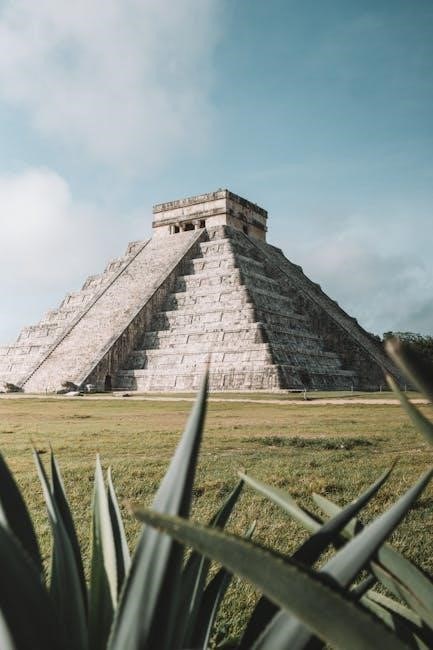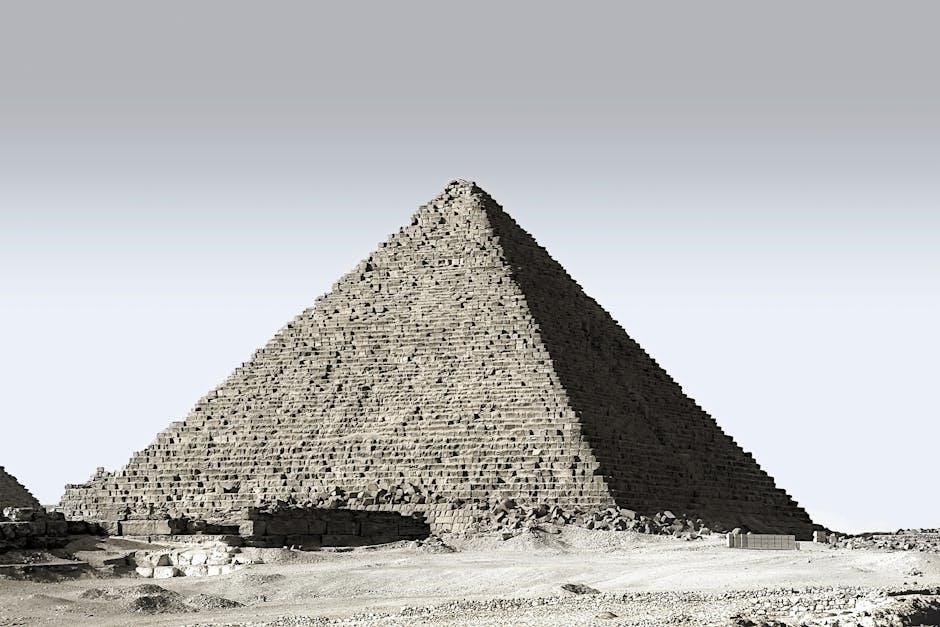El Malei Rachamim is a traditional Jewish prayer for the departed, seeking divine compassion and eternal rest. Available in PDF, it’s accessible worldwide, honoring loved ones with dignity and grace.
1.1. Overview of the Prayer
El Malei Rachamim is a heartfelt Jewish prayer recited to honor the departed, seeking divine compassion and eternal rest. It is traditionally chanted at funerals, memorial services, and during visits to graves, especially on anniversaries of passing. The prayer asks for the soul to be sheltered under God’s wings among the righteous and pure. Widely used in Ashkenazi communities, it is now accessible in PDF formats online, offering a convenient way to recite it with proper transliteration guides, ensuring its tradition endures across generations and geographical boundaries.
1.2. Significance in Jewish Tradition
El Malei Rachamim holds profound significance in Jewish tradition as a prayer offering comfort and solace to mourners. It serves as a poignant expression of faith, bridging the living with the deceased, and is integral to funeral rites, memorial services, and grave visits. Its availability in PDF format ensures accessibility, preserving its traditional use while adapting to modern needs. This prayer provides a meaningful way to honor loved ones, reflecting the enduring importance of compassion and remembrance in Jewish heritage.
Historical Background
El Malei Rachamim originates from Eastern European Ashkenazi tradition, evolving as a heartfelt prayer for the departed. Its historical roots are tied to mourning rituals, with adaptations for Holocaust victims and modern contexts, reflecting its enduring relevance in Jewish commemoration.
2.1. Origins and Evolution
El Malei Rachamim emerged from the Ashkenazi tradition, rooted in Eastern European Jewish customs. It evolved as a poignant prayer for the deceased, seeking divine mercy and eternal rest. Over time, it has been adapted for various purposes, including Holocaust victims and military funerals. Its inclusion in PDF guides has made it widely accessible, ensuring its enduring relevance in modern Jewish practice while preserving its historical significance and emotional resonance for mourners worldwide.
2.2. Development Over Time
El Malei Rachamim has undergone adaptations while maintaining its core purpose. Initially used in Ashkenazi funerals, it expanded to commemorate Holocaust victims and military personnel. Digital versions, including PDFs, have facilitated its accessibility, ensuring precise recitation. This evolution reflects its enduring relevance, blending tradition with modern needs to honor the departed across diverse circumstances and communities.

Occasions for Recitation
El Malei Rachamim is recited at funerals, memorial services, and during visits to graves, especially on anniversaries of passing or in Elul. It is also said after Torah readings commemorating the deceased and during Yahrzeit observances, offering comfort and honoring memories. Available in PDF, it provides accessible guidance for these meaningful moments.
3.1. Funerals and Memorial Services
El Malei Rachamim is a central prayer recited during Jewish funerals and memorial services, offering comfort and solace to mourners. It is typically chanted with a haunting melody, emphasizing the request for divine compassion and eternal rest for the deceased. The prayer is also included in memorial services, providing a meaningful way to honor loved ones. Its availability in PDF format ensures accessibility, allowing individuals to recite it with ease during these solemn occasions, offering emotional support and spiritual connection.
3.2. Grave Visits and Yahrzeit
El Malei Rachamim is traditionally recited during grave visits, especially on Yahrzeit and during Elul, to honor the deceased. Its PDF version offers easy access for those visiting graves, ensuring proper recitation. The prayer seeks divine compassion, providing solace to mourners and comforting the soul of the departed. Reciting it on these occasions strengthens the connection with loved ones and upholds Jewish traditions of remembrance and respect. Its availability online makes it a convenient resource for those observing these meaningful rituals.
3.3. Special Occasions and Commemorations
El Malei Rachamim is also recited on special occasions, such as Holocaust Remembrance Day and Yom HaZikaron, honoring fallen soldiers. Its PDF version includes adaptations for these commemorations, ensuring accessibility. The prayer has been tailored for victims of the Holocaust and military personnel, reflecting its evolving role in Jewish tradition. Reciting it on these days provides comfort and connects communities to their heritage. The availability of the prayer in PDF format facilitates its use during these meaningful events, preserving its emotional and historical significance.
Structure of the Prayer
El Malei Rachamim begins with a plea for divine compassion, requesting rest for the soul. It includes references to the afterlife and divine wings, with a concluding Amen. Available in PDF, it maintains traditional Hebrew text with transliterations, ensuring accessibility for all. The prayer’s structure reflects its purpose of comforting mourners and honoring the deceased, blending tradition with modern accessibility through digital formats.
4.1. Key Components and Their Meanings
The prayer begins with a plea for divine compassion, requesting rest for the soul under God’s wings. It mentions the soul’s journey to the afterlife, seeking peace in Gan Eden. Key elements include references to charity in the deceased’s memory and a request to bind their soul in the bond of life. The prayer concludes with a communal “Amen,” reaffirming faith and comfort. Available in PDF, it includes transliterations, making it accessible to those less familiar with Hebrew, while preserving its traditional and emotional depth.
4.2. Transliteration Guide
A transliteration guide for El Malei Rachamim provides an English phonetic rendering of the Hebrew text, enabling those unfamiliar with the language to recite it accurately. This tool is invaluable for maintaining the prayer’s integrity while making it accessible to a broader audience. The guide includes syllable breakdowns and pronunciation tips, ensuring proper intonation and emotional expression during recitation. Available in PDF formats, it often accompanies the original Hebrew text, fostering unity between tradition and accessibility for all who seek to honor their loved ones.
Recitation Guidelines
El Malei Rachamim is traditionally recited by the Hazzan, with congregational participation, at funerals, memorial services, and grave visits, ensuring proper etiquette and emotional resonance in honoring the departed.
5.1. Proper Etiquette and Practices
The Hazzan typically leads the congregation in reciting El Malei Rachamim, standing with reverence. Participants are expected to maintain solemnity, reflecting on the departed’s memory. The prayer emphasizes divine compassion, seeking eternal rest for the soul. When reciting, it is customary to mention the deceased’s Hebrew name and their father’s name, though English names may be used if the Hebrew name is unknown. The congregation often responds with “Amen” as a collective affirmation. Charity is frequently donated in the deceased’s honor, aligning with the prayer’s themes of mercy and remembrance.
5.2. Role of the Hazzan and Congregation
The Hazzan plays a central role in leading the recitation of El Malei Rachamim, ensuring the prayer’s melody and rhythm are rendered with dignity. The congregation actively participates by responding to key phrases, fostering a collective sense of mourning and solidarity. Their presence underscores communal support for the bereaved family. Through this shared observance, the congregation and Hazzan together honor the deceased, seeking divine mercy and eternal rest for their soul, while offering comfort to those in grief.

Availability in PDF Format
El Malei Rachamim is readily available in PDF format from reliable sources like Chabad.org, offering easy access for respectful recitation and deeper understanding of its significance.
6.1. Reliable Online Sources
Chabad.org and other trusted Jewish websites provide authentic PDF versions of El Malei Rachamim. These sources ensure accuracy and accessibility, allowing users to download and print the prayer easily. They often include transliterations and translations, making it feasible for everyone to recite the prayer with proper intent. Additionally, these platforms offer guides and explanations, enhancing understanding and observance. This convenience supports global access, preserving the tradition while adapting to modern needs.
6.2. Benefits of Digital Access
Digital access to El Malei Rachamim in PDF format offers unparalleled convenience and accessibility. It enables easy downloading, printing, and sharing, making the prayer readily available for recitation worldwide. This modern approach ensures the tradition is preserved while adapting to contemporary needs, allowing mourners to honor their loved ones with ease and reverence. Digital versions often include transliterations and translations, facilitating participation for those less familiar with Hebrew. This accessibility bridges tradition and innovation, ensuring the prayer’s enduring relevance.

Cultural and Traditional Variations
El Malei Rachamim reflects diverse traditions, with Ashkenazi and Sephardic variations, and modern adaptations for special occasions, ensuring its timeless relevance across Jewish communities worldwide.
7.1. Ashkenazi vs. Sephardic Traditions
El Malei Rachamim is primarily recited in Ashkenazi communities, while Sephardic traditions often emphasize Mourner’s Kaddish. Ashkenazi versions include specific memorial prayers, whereas Sephardic practices may vary. Both traditions honor the deceased, but differences in liturgical customs and chants reflect cultural diversity. PDF versions of El Malei Rachamim cater to Ashkenazi practices, offering detailed transliterations and guides, ensuring accessibility for those seeking to observe traditions faithfully.
7.2. Modern Adaptations
Modern adaptations of El Malei Rachamim include its availability in digital formats, enabling easy access for global communities. Some versions incorporate contemporary musical arrangements, blending tradition with modern melody. Specialized prayers now honor victims of the Holocaust and other tragedies, reflecting evolving needs. Multimedia resources, such as video guides, assist in learning proper recitation. These adaptations ensure the prayer remains relevant, bridging ancient traditions with today’s diverse Jewish experiences, while maintaining its core purpose of comforting mourners and honoring the departed.

The Prayer in Modern Context
El Malei Rachamim remains a vital prayer in modern Jewish practice, offering comfort during funerals and memorial services. Its digital availability ensures accessibility for global communities, preserving tradition while adapting to contemporary needs and diverse observances.
8.1. Contemporary Uses and Significance
El Malei Rachamim continues to hold profound significance in modern Jewish practice, offering solace during funerals, memorial services, and grave visits. Its adaptation for Holocaust victims and soldiers underscores its evolving role in commemorating tragic losses. The prayer’s availability in PDF format has made it easily accessible, ensuring its traditions are preserved and shared globally. It remains a vital expression of mourning, providing comfort and unity for grieving communities while honoring the departed with dignity and timeless spiritual resonance.
8.2. Specialized Versions (e.g., Holocaust Victims)
El Malei Rachamim has been adapted to honor specific tragic losses, such as Holocaust victims and fallen soldiers. These versions emphasize divine mercy and eternal rest for those who perished under extraordinary circumstances. The prayer serves as a poignant tribute, acknowledging their sacrifice and enduring memory. Its recitation at memorial services and anniversals provides comfort to mourners, ensuring their legacies endure. These adaptations reflect the prayer’s versatility in addressing historical and communal grief, preserving its relevance across generations and diverse circumstances.
El Malei Rachamim remains a vital prayer for comforting the bereaved, honoring the departed, and connecting with Jewish tradition. Its availability in PDF ensures easy access for recitation and reflection.
9.1. Summary of Importance
El Malei Rachamim is a profound Jewish prayer offering comfort to mourners and honor to the deceased. Its significance lies in its ability to provide solace, facilitate grief processing, and maintain a spiritual connection with loved ones. The prayer’s availability in PDF format ensures accessibility, enabling individuals worldwide to recite it with ease. It serves as a meaningful tradition, fostering community support and perpetuating the memory of the departed. Its relevance endures, bridging generations and reinforcing Jewish heritage through compassionate words and shared rituals.
9.2. Final Thoughts and Reflection
El Malei Rachamim embodies compassion and solace, offering a meaningful way to honor the departed. Its availability in PDF ensures global accessibility, preserving tradition while adapting to modern needs. Reflecting on its significance, this prayer bridges generations, fostering emotional and spiritual connection. It serves as a reminder of the enduring bond between the living and the deceased, providing comfort during grief and a pathway to healing. Through its timeless words, El Malei Rachamim continues to inspire reflection, hope, and unity among those who recite it.
References and Resources
Access the El Malei Rachamim prayer in PDF from reliable sources like Chabad.org for precise transliteration guides and deeper understanding of its significance in Jewish tradition.
10.1. Recommended Reading
For deeper understanding, explore Chabad.org, offering detailed guides and transliterations of El Malei Rachamim. Sefaria and My Jewish Learning provide insights into its historical and cultural significance. These resources enhance your ability to recite the prayer meaningfully, especially in PDF formats available for easy access and reference.
10.2. Online Resources for Further Study
Explore Chabad.org for comprehensive guides and articles on El Malei Rachamim. Websites like Sefaria and My Jewish Learning offer insights into its historical and cultural context. These platforms provide accessible resources, including PDF versions of the prayer, transliterations, and explanations, making it easier to study and recite El Malei Rachamim with understanding and reverence.
